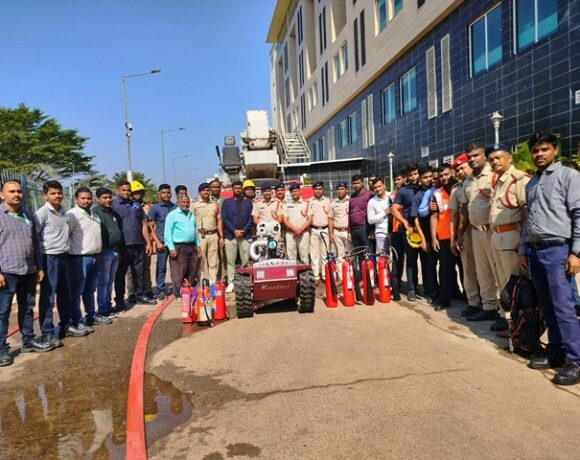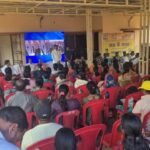Mango Kernel Tragedy: Confronting Food Insecurity, Systemic Neglect
By Chitta Ranjan
The tragic deaths of two women in Mandipanka village, Kandhamal, from consuming mango kernel gruel reveal the stark realities of systemic neglect and deep-seated food insecurity in Odisha’s tribal regions. This heartbreaking event serves as a grim reminder of similar incidents, such as the 2001 Rayagada tragedy, and underscores the urgent need for meaningful reforms. This write-up examines the root causes and proposes actionable solutions for a sustainable and inclusive development model for Odisha’s tribal communities.
The scar left by the death of two women after consuming mango kernel is starkly visible in Mandipanka village of Kandhamal district. The village atmosphere is unusually silent despite the rush of administration officials, politicians, NGOs, and activists after the October 31 tragedy, which has brought back haunting memories of the infamous 2001 Rayagada district incident when 24 tribals succumbed to a similar situation.
On the path in front of the asbestos-roofed house of Anil Patamajhi stand two plastic chairs covered in white sheets with garlanded photographs of both victims on them. A few feet away, Anil (the Husband of the deceased) struggles to tend to his six-month-old daughter, who has just lost her mother, while her grandmother battles the consequences at MKCG Medical College and Hospital in Berhampur.
On October 31, his wife Ramita (28) and a neighbor, Runu Majhi (30), died while six others were hospitalized after consuming the fatal gruel. Though three of the six injured, including Anil’s sister-in-law, have been discharged after treatment, his mother is still admitted to MKCG MCH, and two other neighbors are at SCB Medical College and Hospital in Cuttack.
“This mango kernel took the life of my wife. Had there been sufficient rice, we would not have consumed the mango kernel gruel,” said Anil, pointing his finger towards the leftover kernels kept in a polythene carry bag.
He was unaware of his wife’s health condition until she complained of vomiting hours before her death.
“I called a fellow villager to come with his auto and rushed my wife to
Brahmanigaon PHC, nearly 9 km away from our village. A doctor there referred her to Berhampur hospital after administering saline. She succumbed while undergoing treatment. Before I could think what happened, my wife had already gone,” he said in a choked voice.
His ordeal did not end there. He had to borrow money to pay Rs 7,000 to a private
ambulance to bring back his wife’s body. Although the state’s Mahaprayan Yojana offers free transport of dead bodies from government hospitals for poor families, it often fails to benefit people due to inadequate hearse vehicles.
“I requested a vehicle to carry my wife’s body. The hospital officials refused and said no vehicle is available. I had to arrange money from my relatives to pay the private ambulance,” he said.
Runu’s family members had to pay Rs 4,000 to bring back her body from another hospital where she was admitted.
Describing the fateful day, Anil said Runu had recooked the leftover gruel kept open for two-three days and distributed it among the women members of the three families.
“We had taken fermented water rice while the children had gone to the Anganwadi centre where they had food. This saved our and the children’s lives,” he said.
Delay in PDS Supply Led to the Tragedy
The heart-wrenching Mandipanka incident underscores the dire food insecurity faced by tribal communities. The families turned to mango kernel gruel as they had no rice left.
While the state government provides free 5 kg of rice per person, the quantity falls woefully short for many households, particularly the marginalized and small landholding tribal communities who sustain only on rice as they have no means to get other food.
Delays in PDS supply are frequent, while the exclusion of members from ration cards compounds their woes.
About Mandipanka:
Mandipanka, a village in Kandhamal district, symbolizes the paradox of rural development claims versus ground realities. Despite government assertions of improved infrastructure, families like Anil Patamajhi’s live with inadequate access to food, water, and healthcare. The family’s reliance on mango kernel gruel, after running out of rice due to delays in the Public Distribution System (PDS), led to the death of Anil’s wife and neighbor while hospitalizing others.
The incident not only exposes food insecurity but also the lack of affordable healthcare and transportation. Anil’s struggle to transport his wife’s body highlights the failure of schemes like the Mahaprayan Yojana, which promises free transportation of deceased individuals but remains inaccessible for many. These systemic gaps leave vulnerable families to bear the devastating consequences.
Food Insecurity and the PDS Crisis
Food insecurity continues to plague tribal regions where subsistence farming and small landholdings dominate. Families depend heavily on the PDS, which often fails to meet their needs due to irregularities and delays. In Mandipanka, rice arrived two days too late, underscoring the inefficiencies of the current system.
The quarterly rice distribution system, intended to cut government costs, disregards the logistical and financial burdens faced by beneficiaries, especially those in remote areas.
Many tribal families are also excluded from PDS benefits due to outdated ration cards and administrative inertia.
Recommendations for PDS Reform:
• Shift to monthly distributions to alleviate the stress of prolonged shortages.
• Establish accessible distribution centers closer to villages.
• Conduct regular updates to beneficiary lists, ensuring no one is left behind.
Traditional Dietary Practices and Nutritional Vulnerability
Traditional diets among tribal communities often include forest produce like mango kernels during crises. While these foods are integral to their cultural identity, their consumption becomes a survival strategy during extreme scarcity. Mango kernels, if improperly processed, can be toxic, as seen in the Mandipanka tragedy.
Suggestions for Enhancing Nutritional Security:
• Promote training on safe food preparation techniques for items like mango
kernels.
• Improve access to nutritionally rich food alternatives such as pulses, vegetables, and protein sources through local markets and government programmes.
• Blend traditional diets with modern nutritional interventions to enhance food safety and dietary diversity.
Infrastructure, Sanitation, and Healthcare Challenges
In Mandipanka, testing revealed fecal contamination in water sources and fungal toxins in the consumed gruel, emphasizing the dire need for clean drinking water and sanitation. Despite infrastructure developments under schemes like Swachh Bharat Mission, operational deficiencies persist.
Healthcare facilities are another critical gap. Emergency services and affordable
healthcare are inaccessible, leaving families reliant on expensive private options. The absence of functional transport schemes further exacerbates the issue.
Proposed Measures:
• Regular monitoring and maintenance of water and sanitation infrastructure.
• Expansion of emergency healthcare facilities and affordable transportation
options for tribal areas.
• Strengthen the implementation of programs like Mahaprayan Yojana to ensure
reliable support for families in distress.
Governance and Systemic Accountability
The transfer of officials following the Mandipanka incident is a superficial response to systemic failures. Accountability must extend beyond individuals to address the structural deficiencies in governance and service delivery.
Strengthening local self-governance through the Panchayat (Extension to Scheduled Areas) Act (PESA) and the Forest Rights Act (FRA) is essential to empowering tribal communities to address their own development challenges.
Recommendations for Governance Improvement:
• Train Gram Panchayats (GPs) to effectively identify and support vulnerable
groups.
• Link PRIs with schemes like Mission Jeevika and Mo Upakari Bagichha to
enhance livelihoods and food security.
• Promote community-led planning and resource management for sustainable
development.
Building Sustainable Livelihoods: The Role of Mango Kernels
Mango kernels, though historically associated with survival foods, have untapped
potential as a resource for sustainable livelihood projects. Their processing into valueadded products could provide economic opportunities while reducing their role as a crisis food.
Potential Initiatives:
• Develop mango kernel-based enterprises through capacity-building programs
for local communities and PRIs.
• Integrate such activities under MGNREGS to create employment opportunities and community assets.
• Establish a supply chain model for mango kernel products, aligning with FRA
mandates on forest resource utilization.
Gender-Inclusive Development
Women in tribal areas face disproportionate challenges, from limited participation in governance to barriers in accessing social security benefits. Addressing these issues requires gender-sensitive approaches to governance and economic planning.
Strategies for Gender Inclusion:
• Schedule Gram Sabha meetings at times convenient for women.
• Conduct training on women’s rights and leadership to encourage active
participation.
• Design livelihood initiatives, such as mango kernel processing, that offer flexible
work options compatible with caregiving roles.
The Role of Civil Society
Civil society organizations and NGOs play a critical role in supporting tribal communities.
However, their impact must be reoriented towards achieving measurable outcomes in food security, healthcare, and sanitation.
Key Actions for NGOs:
• Partner with government agencies to advocate for policy reforms and improved
service delivery.
• Focus on grassroots-level capacity building and empowerment programs.
• Ensure transparency and accountability in the use of funds and project
implementation.
A Call to Action
The Mandipanka tragedy is a stark reminder of the systemic neglect faced by tribal communities. Addressing this requires a multi-faceted approach involving government, civil society, and local leaders. Strengthening governance under PESA and FRA, reforming the PDS, enhancing infrastructure, and promoting sustainable livelihoods are essential steps toward empowering these communities.
By fostering inclusive, community-led development, Kandhamal can transform its
challenges into opportunities. This approach not only honors the rights and dignity of tribal populations but also ensures their resilience and prosperity in the face of systemic adversity.
(The author is Development Consultant, Natural Resource Governance, Tribal Livelihood)







